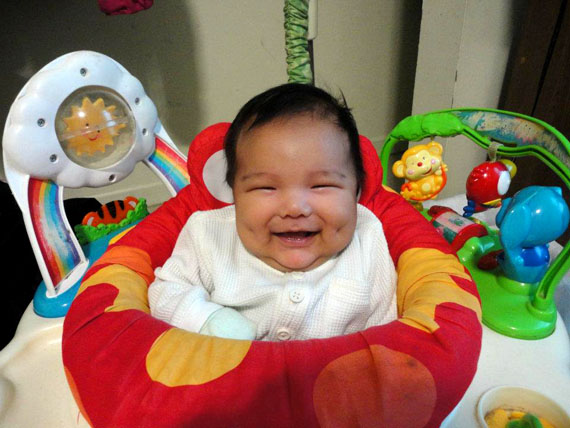Grieving Nunavut mother recalls her baby’s last living moments
Neevee Akesuk said Baby Makibi had breathing problems and wouldn’t stop crying

The death of Baby Makibi in 2012 continues to provoke unanswered questions. (FILE PHOTO)
CAPE DORSET—The long-awaited coroner’s inquest into the 2012 death of three-month-old Makibi Olayuk Akesuk got underway in Cape Dorset Nov. 22 with testimony from the baby’s grieving mother.
The family’s lawyer, Kathryn Kellough, called Neevee Akesuk as the first witness of the inquest, which is expected to run four days at the local community hall.
Shortly after being sworn in, Neevee listened to a 12-minute audio recording of a statement she gave to the RCMP six days after the death of her first-born.
In a hoarse low voice, Neevee described in the statement how she called the community health centre on April 4, 2012 and told nurse Debbie McKeown that her newborn son wouldn’t stop crying and was congested.
McKeown told Neevee to bathe her infant and come in the next morning, the coroner’s jury heard from the statement.
On the witness stand in the community hall on Nov. 22, Neevee hid her face silently in her palm as she listened to her own statement.
Her foot began to twitch and finally she sobbed out loud.
In the back of the courtroom, her eight-month-old baby boy slept quietly on a pile of parkas.
The Government of Nunavut called a coroner’s inquest into Baby Makibi’s death in February, after mounting pressure from the baby’s parents and from an independent report that found the Cape Dorset health centre in a dysfunctional state in April 2012.
The presiding coroner, Garth Eggenberger from the Northwest Territories, told the six-member jury—four women and two men—that the point of the inquest is “to ensure the death is not concealed or ignored” and “to make the public aware of the circumstances surrounding the death.”
The inquest is a “fact-finding” not a “fault-finding” body, Eggenberger said.
The coroner’s lawyer, Amy Groothuis, told the jury that besides making recommendations aimed at preventing similar deaths in the future, the jury must also address:
• the identity of the deceased individual;
• the location and time of death;
• the cause of death;
• the manner of death; and,
• the circumstances surrounding the death.
Kellough asked Neevee what it was like to be a first-time mother in 2012.
“It was amazing to be a mother. We had a lot of support from our family,” Neevee said.
For the most part, Makibi was like any other infant in the first three months of his life, Neevee said.
He cried a lot during the first month, less in the second month and then got fussy and cranky again towards the end of his life, the jury heard.
According to health records presented by Kellough, Baby Makibi did have a check-up when he was about two weeks old, when he showed “yellow whitish discharge” from his nose.
But Neevee said she was never tested for Cytomegalavirus during her pregnancy—that’s the virus that pathologists, expected to testify later in the inquest, originally thought Baby Makibi died of.
Pathologists later switched their findings to sudden infant death syndrome, or SIDS—a catch-all category used to describe infant deaths that cannot be explained by anything else.
But on April 4, 2012, Baby Makikbi was sicker than he had ever been in his short life, Neevee said
“The sound of his crying was different. He sounded tired… he was coughing… It looked like he was catching for a breath when nursing. His breathing was faster.”
On a scale of one to 10, where one is not at all concerned and 10 is extremely concerned, Neevee said her concern level was at seven around 4 p.m. that day and 10 when she finally called the health centre around 9 p.m.
“Did you think he was getting worse, is that why you called?” Kellough asked Neevee.
“Yes,” Neevee said.
“How were you feeling when you called?”
“Scared because I didn’t know what to do because I was a first-time parent.”
“What did you tell Debbie McKeown?”
“Told her my baby was crying a lot and I couldn’t make him stop crying. He was breastfeeding differently and breathing funny. I asked her to come into the clinic.”
“Did she ask you any questions?”
“She asked me if he had a fever… I couldn’t check because I didn’t have a thermometer.”
“Did she ask you any other questions? Did she ask if he had a wet diaper?”
“I don’t remember her asking that… She told me to give him a bath and take him in in the morning. I said I wanted to take him in to be seen.”
According to a number of Government of Nunavut policies, nurses must see infants presenting any symptoms in-person if contacted after hours.
After the two or three-minute phone call with McKeown, Neevee said she and Baby Makibi’s aunt did their best to soothe the baby until he finally fell asleep around midnight, lying on his stomach with a blanket lightly draped over him.
Neevee testified in a quiet but steady voice.
But when Kellough began asking Neevee about finding her infant non-breathing around 3 a.m. on April 5, 2012, Neevee’s composure broke.
Eggenberger called an early lunch recess Nov. 22, with Neevee expected to continue her testimony at 1:30 p.m.
Coroner’s lawyer Groothuis said the inquest would hear testimony from RCMP members, nurses and GN officials.
But McKeown has not been found and therefore could not be served a court order compelling her to testify, Groothuis said.
The lawyer said McKeown might be housed at a health facility in Guelph, Ontario called Homewood Health Centre.
But staff at the facility would not confirm if McKeown was indeed a patient, Groothuis said.





(0) Comments